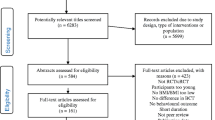ABSTRACT
Multiple behavior change is widely used to reduce targeted health behaviors; however, its effect on behaviors such as physical activity, nutrition, and alcohol and tobacco use among older adults remains inconclusive. The primary purpose of this systematic review was to evaluate the effects of single health behavior change (SHBC) interventions vs. multiple health behavior change (MHBC) interventions among older age individuals. PubMed was searched for publications on health behavior interventions from 2006 to 2011. Twenty-one randomized clinical trials assessed the effects of health behavior change in older individuals. Results were reviewed by a number of health behaviors and effectiveness. Results revealed that within SHBC interventions, physical activity or exercise behavior revealed that interventions were the most common and showed the most promise in influencing positive outcomes in physical activity behavior among community-dwelling older adults. There were too few MHBC studies identified to allow confident comparison to SHBC interventions. The MHBC field is still at an early stage within the older adult literature, and more attention is recommended to investigate if the benefits of MHBC apply to this age group.


Similar content being viewed by others
References
Baker MK, Kennedy DL, Boble PL, et al. Efficacy and feasibility of a novel tri-modal robust exercise prescription in a retirement community: a randomized, controlled trial. J Am Geriatr Soc. 2007;55(1):1-10.
Borschman K, Moore K, Russell M, Ledgerwood K, Renehan E, Lin X. Overcoming barriers to physical activity among culturally and linguistically diverse older adults: a randomized controlled trial. Australas J Aging. 2009;29(2):77-80.
Campbell MK, Carr C, DeVellis B, et al. A randomized trial of tailoring and motivational interviewing to promote fruit and vegetable consumption for cancer prevention and control. Ann Behav Med. 2009;38(2):71-85.
Centers for Disease Control and Prevention Healthy Aging Program State of Aging and Health in America Available at: http://www.cdc.gov/aging/data/stateofaging.htm. Accessed September 20, 2011.
Centers for Disease Control and Prevention Chronic Disease Prevention and Health Promotion Healthy Aging. Available at: http://www.cdc.gov/chronicdisease/resources/publications/AAG/aging.htm. Accessed September 20, 2011.
Duru OK, Sarkisian CA, Leng M, Mangione CM. Sisters in motion: a randomized controlled trial of a faith-based physical activity intervention. J Am Geriatr Soc. 2010;58(10):1863-1869.
Edington DW, Yen LT, Witting P. The financial impact of changes in personal health practices. J Occup Environ Med. 1997;39:1037-1046.
Fielding RA, Katula J, Miller ME, et al. Activity adherence and physical function in older adults with functional limitations. Med Sci Sports Exerc. 2007;39:1977-2004.
Fisher EB, Fitzgibbon ML, Glasgow RE, et al. Behavior matters. Am J Prev Med. 2011;40(5):e15-e30.
Goldstein MG, Whitlock EP, Depue J. Multiple behavioral risk factor interventions in primary care: summary of research evidence. Am J Prev Med. 2007;27:61-79.
Greene GW, Fey-Yensan N, Padula C, Rossi S, Rossi JS, Clark PG. Change in Fruit and Vegetable intake over 24 months in older adults: results of the SENIOR Project intervention. Gerontologist. 2008;48(3):378-387.
Higgins JPT, Green S (editors). Cochrane Handbook for Systematic Reviews of Interventions Version 5.1.0 [updated March 2011]. The Cochrane Collaboration, 2011. Available from: www.cochrane-handbook.org.
Johnson SS, Pavia AL, Cummins CO, et al. Transtheoretical model-based multiple behavior intervention for weight management: effectiveness on a population basis. Prev Med. 2008;46(3):238-246.
Jones H, Edwards L, Greene G, et al. The efficacy of stages of change interventions in diabetes self-care and control. In: 61st Annual Conference of the American Diabetes Association. Philadelphia, PA; 2001.
Jones H, Edwards L, Vallis TM, et al. Changes in diabetes self-care behaviors make a difference in glycemic control: the Diabetes Stages of Change (DiSC) study. Diabetes Care. 2003;26(3):732-737.
Kolt GS, Schofield GM, Kerse N, Garrett N, Oliver M. Effect of telephone counseling on physical activity for low-active older people in primary care: a randomized, controlled trial. J Am Geriatr Soc. 2007;55:986-992.
Lin JC, Karno MP, Barry KL, Blow FC, Davis JW, Tang L, Moore AA. Determinants of elderly reductions in drinking in older-at-risk drinkers participating in the intervention arm of a trial to reduce at-risk drinking in primary care. J Am Geriatr Soc. 2010;58:227-233.
McMurdo ME, Sugden J, Argo I, et al. Do pedometers increase physical activity in sedentary older women? A randomized controlled trial. J Am Geriatr Soc. 2010;58:2099-2106.
Moore AA, Blow FC, Hoffing M, et al. Primary care-based intervention to reduce at-risk drinking in older adults: a randomized control trial. Soc Study Addict. 2010;106:111-120.
Nigg CR, Allegrante JP, Ory M. Theory-comparison and multiple-behavior research: common themes advancing health behavior research. Heal Educ Res. 1999;17:670-679.
Patterson R. Changing Patient Behavior: Improving Outcomes in Health and Disease Management. San Francisco: Jossey-Bass; 2001:238.
Prochaska JO. Multiple health behavior research represents the future of preventive medicine. Prev Med. 2008;46:281-285.
Prochaska JJ, Nigg CR, Spring B, Velicer WF, Prochaska JO. The benefits and challenges of multiple health behavior change in research and in practice. Prev Med. 2010;50:26-29.
Prochaska JJ, Spring B, Nigg CR. Multiple health behavior change research: an introduction and overview. Prev Med. 2008;46(3):181-188.
Prochaska JJ, Velicer WF, Nigg CR, Prochaska JO. Methods of quantifying change in multiple risk factor interventions. Prev Med. 2008;46:260-265.
Prochaska JO, Velicer WF, Rossi JS. Multiple risk expert systems interventions: impact of simultaneous stage-matched expert system interventions for smoking, high-fat diet, and sun exposure in a population of parents. Heal Psychol. 2004;23(5):503-516.
Prochaska JO, Velicer WF, Redding C. Stage-based expert systems to guide a population of primary care patients to quit smoking, eat healthier, prevent skin cancer, and receive regular mammograms. Prev Med. 2005;41(2):406-416.
Prochaska JJ, Velicer WF, Prochaska JO, Delucchi K, Hall SM. Comparing intervention outcomes in smokers treated for single versus multiple behavioral risks. Heal Psychol. 2006;25(3):380-388.
Rejeski WJ, Mihalko SL, Ambrosius WT, Bearon LB, McClelland JW. Weight loss and self-regulatory eating efficacy in older adults: the cooperative lifestyle intervention program. The J Gerontol, Ser B Psychol Sci Soc Sci. 2011;66(3):279-286.
Resnick B, Luisi D, Vogel A. Testing the Senior Exercise Self-efficacy Project (SESEP) for use with urban dwelling minority older adults. Public Health Nurs. 2008;25(3):221-234.
Rossi J (editor). The healthy changes trial biomedical results. In L. Ruggiero (Chair). Helping people change: the impact of stage-based behavior change interventions in diabetes care. In: 28th Annual Conference of the American Association of Diabetes Educators. Louisville, KY; 2001.
Stewart AL, Verboncoeur CJ, McLellan BY, et al. Physical activity outcomes of CHAMPS II: a physical activity promotion program for older adults. The J Gerontol Ser A Biol Sci Med Sci. 2001;56(8):M465-M470.
Tan EJ, Qiau-Li X, Tao L, Carlson M, Fried L. Volunteering: a physical activity intervention for older adults—the Experience Corps program in Baltimore. J Urban Health Bull NY Acad Med. 2006;83(5):954-969.
Teri L, McCurry SM, Hogsdon RG, Gibbons LE, Buchner DM, Larson EB. A randomized controlled clinical trial of the Seattle protocol for activity in older adults. J Am Geriatr Soc. 2011;59:1188-1196.
Troyer JL, Racine EF, Ngugi GW, McAuley WJ. The effect of home-delivered Dietary Approach to Stop Hypertension (DASH) meals on the diets of older adults with cardiovascular disease. Am J Clin Nutr. 2010;91:1204-1212.
Weinstock RS, Brooks G, Palmas W, et al. Lessened decline in physical activity and impairment of older adults with diabetes with telemedicine and pedometer use: results from the IDEATel study. Age Aging. 2011;40:98-105.
van Stralen MM, de Vries H, Bolman C, Mudde AN, Lechner L. Exploring the efficacy and moderators of two computer-tailored physical activity interventions for older adults: a randomized control trial. Ann Behav Med. 2010;39:139-150.
Acknowledgments
Support for CRL was provided by R25 CA090956.
Author information
Authors and Affiliations
Corresponding author
Additional information
Implications
Research: More MHBC studies are needed in older adults to inform if such approaches are effective, provide synergy, provide savings of resources, are more cost effective; or if they provide too large of a burden, are too confusing; and ultimately if MHBC is a better investment compared to SHBC approaches.
Practice: Older adults respond well to behavior change interventions delivered one behavior at a time. Practical experience in MHBC needs to be gained, evaluated, and documented to see if MHBC interventions are feasible and accepted by older adults.
Policy: Evidence-based single health behavior change programs exist for older adults; however, the evidence of multiple health behavior change does not yet exist.
About this article
Cite this article
Nigg, C.R., Long, C.R. A systematic review of single health behavior change interventions vs. multiple health behavior change interventions among older adults. Behav. Med. Pract. Policy Res. 2, 163–179 (2012). https://doi.org/10.1007/s13142-012-0130-y
Published:
Issue Date:
DOI: https://doi.org/10.1007/s13142-012-0130-y




